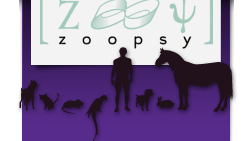

Publications internationales
Publications internationales
Cette rubrique vous propose des articles publiés par nos membres dans des revues scientifiques internationales. Pour accéder à
l'archive complète de notre veille bibliographique (2872 articles), rendez-vous dans la partie réservée
aux adhérents.
19 article(s)
Animal Behavior and Cognition
Effects of anxiety on canine movement in dog-robot interactions
Anna Zamansky, Stephane Bleuer-Elsner, Sylvia Masson, Shir Amir, Ofer Magen, Dirk van der Linden
Animals
Computational Analysis of Movement Patterns of Dogs with ADHD-Like Behavior
Stephane Bleuer-Elsner, Anna Zamansky, Asaf Fux, Dmitry Kaplun, Sergey Romanov, Aleksandr Sinitca, Sylvia Masson, Dirk van der Linden
Dog Behavior
Assessment of a canine Hypersensitivity - Hyperactivity syndrome rating scale
Nathalie Marlois, Daniel Groux, Catherine Mege, Claude Béata, Guillaume Sarcey, Nicolas Massal, Sylvia Masson, Fabien Subtil, Muriel Marion
Retrospective study on hypersensitivity-hyperactivity syndrome in dogs: Long-term outcome of high dose fluoxetine treatment and proposal of a clinical score
Sylvia Masson, Emmanuel Gaultier
Separation-related disorder management through the COVID-19 pandemic: A case report
Stephane Bleuer-Elsner, Sylvia Masson
Use of Cyproterone Acetate in 2 cases of unresponsive offensive social aggressions
Sylvia Masson, Gérard Muller
Journal of Feline Medicine and Surgery
Double-blind, placebo-controlled trial of venlafaxine to treat behavioural disorders in cats: a pilot study
Delphine Metz, Tiphaine Medam, Sylvia Masson
Journal of the American Veterinary Medical Association
Clinical evaluation of the effects of a single oral dose of gabapentin on fear-based aggressive behaviors in cats during veterinary examinations
Marie Kruszka, Edith Graff, Tiphaine Medam, Sylvia Masson
Journal of Veterinary Behavior: Clinical Applications and Research
Descriptive study of dog bites in France—Severity factors, factors of onset of sequelae, and circumstances. Results of a survey conducted by InVS and Zoopsy in 2009-2010
Guillaume Sarcey, Cécile Ricard, Bertrand Thelot, Claude Beata
Effect of alpha-casozepine (Zylkene) on anxiety in cats
Claude Beata, Edith Beaumont-Graff, Victoria Coll, Jacques Cordel, Muriel Marion, Nicolas Massal, Nathalie Marlois, Jerome Tauzin
Effect of fluoxetine at a dosage of 2-4 mg/kg daily in dogs exhibiting hypersensitivity-hyperactivity syndrome, a retrospective study
Stéphane Bleuer-Elsner, Gérard Muller, Claude Béata, Anna Zamansky, Nathalie Marlois
Effects of alpha-casozepine (Zylkene) versus selegiline hydrochloride (Selgian, Anipryl) on anxiety disorders in dogs
Claude Béata, Edith Beaumont-Graff, Christian Diaz, Muriel Marion, Nicolas Massal, Nathalie Marlois, Gérard Muller, Catherine Lefranc
Electronic training devices: Discussion on the pros and cons of their use in dogs as a basis for the position statement of the European Society of Veterinary Clinical Ethology
Sylvia Masson, Silvia de la Vega, Angelo Gazzano, Chiara Mariti, Gonçalo Da Graça Pereira, Christine Halsberghe, Anneli Muser Leyvraz, Kevin McPeake, Barbara Schoening
Field assessment of cats' litter box substrate preferences
Virginie Villeneuve-Beugnet, Frederic Beugnet
Link between foreign body ingestion and behavioural disorder in dogs
Sylvia Masson, Nadège Guitaut, Tiphaine Medam, Claude Béata
Questionnaire survey on the use of different e-collar types in France in everyday life with a view to providing recommendations for possible future regulations
Sylvia Masson, Isabelle Nigron, Emmanuel Gaultier
Retrospective study on the use of venlafaxine in 176 cats diagnosed with behavioral disorders
Sylvia Masson, Delphine Metz, Stéphane Bleuer-Elsner, Françoise Schwobthaler
Study of aggressiveness in livestock-guarding dogs based on rearing method
Muriel Marion, Claude Béata, Guillaume Sarcey, Sophie Delfante, Nathalie Marlois
VetRecord
Effects of a single oral dose of gabapentin on stormphobia in dogs: A double-blind, placebo-controlled crossover trial
Stephane Bleuer-Elsner, Tiphaine Medam, Sylvia Masson
|


